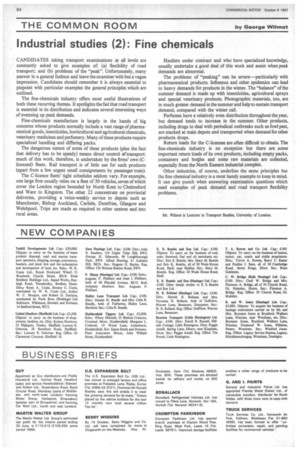THE COMMON ROOM by George Wilmot
Page 86

If you've noticed an error in this article please click here to report it so we can fix it.
Industrial studies (2): Fine chemicals
CANDIDATES taking transport examinations at all levels are constantly asked to give examples of: (a) flexibility of road transport; and (b) problems of the "peak". Unfortunately, many answer in a general fashion and leave the examiner with but a vague impression. Candidates should remember it is always essential to pinpoint with particular examples the general principles which are outlined.
The fine-chemicals industry offers most useful illustrations of both these recurring themes. It spotlights the fad that road transport is essential in its distribution and indicates several interesting ways of evenning up peak demands.
Fine-chemicals manufacture is largely in the hands of big concerns whose products normally include a vast range of pharmaceutical goods, insecticides, horticultural and agricultural chemicals, veterinary medicines and perfumery. Many of these products require specialized handling and differing packs.
The dangerous nature of some of these products (plus the fact that delivery has to be speedy) means direct control of transport: much of this work, therefore, is undertaken by the firms' own (Clicensed) fleets. Rail transport is of little use for such products (apart from a few urgent small consignments by passenger train).
The C-licence fleets' tight schedules seldom vary. For example, one large firm usually relies on a fleet of 30 vehicles, seven of which cover the London region bounded by North Kent to Chelmsford and Ware to Kingston. The other 23 concentrate on provincial deliveries, providing a twice-weekly service to depots such as Manchester, Bishop Auckland, Carlisle, Dumfries, Glasgow and Welshpool. Trips are made as required to other centres and into rural areas. Hauliers under contract and who have specialized knowledge, usually undertake a good deal of this work and assist when peak demands are abnormal.
The problems of "peaking" can be severe—particularly with pharmaceutical products. Influenza and other epidemics can lead to heavy demands for products in the winter. The "balance" of the summer demand is made up with insecticides, agricultural sprays and special veterinary products. Photographic materials, too, are in much greater demand in the summer and help to sustain transport demand, compared with the winter call.
Perfumes have a relatively even distribution throughout the year, but demand tends to increase in the summer, Other products, including drugs to deal with periodical outbreaks such as fowl pest, are stacked at main depots and transported when demand for other products drops.
Return loads for the C-licensee are often difficult to obtain. The fine-chemicals industry is no exception but there are some important return loads of its own products, including empty packs, containers and boVies and some raw materials are collected, especially from the North Eastern industrial complex.
Other industries, of course, underline the same principles but the fine chemical industry is a most handy example to keep in mind. It can give punch when answering examination questions which need examples of peak demand and road transport flexibility problems.
































































































































